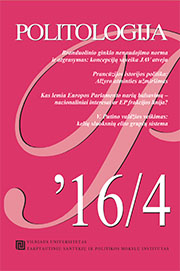Kas lemia europos parlamento narių balsavimą – nacionaliniai interesai ar ep frakcijos linija?
What determines the voting of European Parliament members – a national interest or an EP party line?
Author(s): Rolandas Tučas, Ieva SavickaitėSubject(s): Politics, Methodology and research technology, Transformation Period (1990 - 2010), Present Times (2010 - today), EU-Legislation, Geopolitics
Published by: Vilniaus universiteto leidykla & VU Tarptautinių santykių ir politikos mokslų institutas
Summary/Abstract: The European Parliament has gained more legitimacy power after Lisbon treaty in 2009. However, there is unclear how EP members are distributing their votes. Do they vote according with the EP party line or their national interest? This scientific article attempts to look at the MEPs voting related to foreign policy issues that are identified as one of the most sensitive to reach a general consensus. This research focuses on MEPs roll call results related to the EU–Russia partnership issues from 2014 to 2015, followed by the annexation of Crimea. Due to this, scientific paper aims to determine the regional dimension between MEPs (geo) political preferences and the relation to Russia votings. This scientific article tests two hypotheses: 1) The voting, following the EP group’s position, is often characterized by MEPs from those countries where there is no clear commitment to Russia. 2) The voting is done in accordance with the national positions often characterized by MEPs from those countries where there is a clear (relatively favorable/critical) position towards Russia. These hypotheses are tested by using roll calls and EU countries position towards Russia index which was updated in this work following the research of S. Braghiroli ir C. Carta. The results partly proved the tested hypotheses. The roll calls confirmed the first hypothesis that voting, following the EP group’s position, is often characterized by MEPs from those countries where there is no clear commitment to Russia. Such voting is often characterized by MEPs from West-Central European countries. The second hypothesis stands to be partly proved. The voting in accordance with the national positions is often characterized by MEPs from those countries where there is a clear critical position towards Russia (mostly from Poland and the Baltic States). However, the results haven’t confirmed that this hypothesis applies as well to MEPs from countries of a relatively favorable stance towards Russia. It discovered that an MEP from these countries tends to abstain more while voting for questions favorable to Russia. This shows another tendency to find a compromise between a national and an EP party line. Recommendations for future research. In order to find out more details related to the voting trends of MEPs, the future research should involve a longer period of roll calls. The research methodology could be enhanced by including details of the MEPs voting “abstentions“. Also, future research could emphasize the “rebels“ in the EP parties who act when expressing „softer“ disapprovals from general party political line by abstaining from the voting.
Journal: Politologija
- Issue Year: 2016
- Issue No: 4 (84)
- Page Range: 86-133
- Page Count: 48
- Language: Lithuanian

